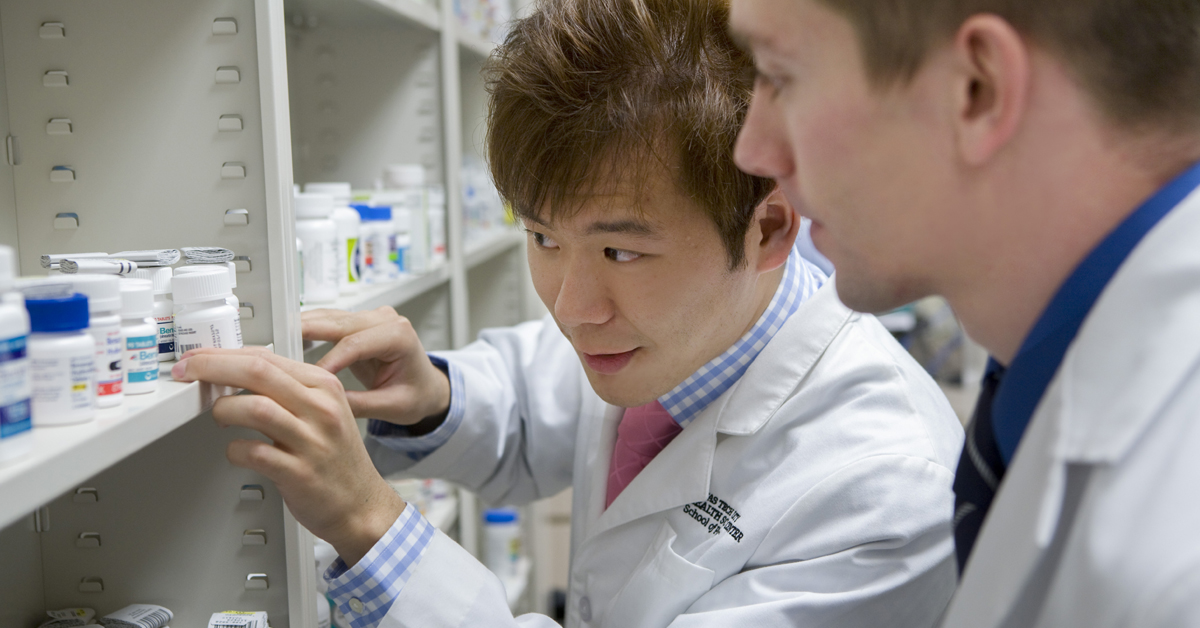Top Five Reasons for Pursuing a Pharmacy Career

Health care in the U.S. is transforming at unprecedented rates — a growth that is spurred, in large part, by the field’s continued transition to value-based care.
Defined by the New England Journal of Medicine as “a healthcare delivery model in which providers, including hospitals and physicians, are paid based on patient health outcomes,” value-based care is an evidence-based approach that ultimately offers benefits for providers, patients, and the health of the entire community by achieving better outcomes at a lower price-point. This is in contrast to the more traditional fee-for-service model, in which reimbursement is based primarily on the quantity of services provided.
With health outcomes front-and-center in medicine today, health care organizations are relying on a variety of professionals, from nurse practitioners to physician assistants, to supplement the ranks of physicians in order to ensure that patients receive the highest level of services for every dollar spent. A role that is growing in importance in line with this trend is that of the pharmacist. In rural communities, in particular, pharmacy professionals are playing an increasingly active role as part of health care teams that aim to help patients access quality care at every point of their medical journey.
Wondering if a pharmacy career is right for you? Consider these five reasons to further your education by enrolling in pharmacy school:
1. You’ll Benefit From Diverse Career Options
The role of the pharmacist is fairly familiar in the U.S. but many people do not realize
that pharmacy is a diverse field that offers a wide variety of career opportunities.
While there are certainly opportunities to dispense prescriptions behind a counter,
that is far from the only responsibility performed by professionals working in this
exciting facet of health care.
Wondering what jobs can you get with a pharmacy degree? According to Professor Eric
MacLaughlin, Pharm.D., Chair of the Department of Pharmacy Practice at Texas Tech
University Health Sciences Center Jerry H. Hodge School of Pharmacy, students who
graduate from pharmacy school are equipped for a number of interesting positions.
“There is a wide variety of areas that you can actually go into with a pharmacy degree,”
MacLaughlin says. “When it comes to pharmacy careers, people usually think about community
pharmacy and they may even think of the hospital setting, but what they may not realize
is that there are a lot of diverse opportunities out there, ranging from business
management to nuclear pharmacy. If you are more interested in working directly with
patients, a pharmacy degree can also qualify you to work as a clinical specialist.”
Clinical specialists work directly with other health care providers in a variety of
settings to ensure optimized prescription and use of medications. The responsibilities
of these professionals typically relate to the assessment and monitoring of patients
and their prescribed drugs. Clinical specialist roles are available in many areas
of health care, including cardiology, infectious disease, oncology, psychiatry, and
transplant.
Looking for something else for your pharmacy career? With a pharmacy degree, you are
not limited to working in a hospital or similar clinical setting. According to MacLaughlin,
professionals with pharmacy backgrounds also sometimes go into regulatory work with
the U.S. Food and Drug Administration or other areas of public health service.
“Personally, I think the fact that there is such variety is one of the top reasons
to pursue a pharmacy career,” MacLaughlin says. “There are so many areas that you
can go into.”
2. You Can Help Shape an Evolving Role
As health care professionals struggle to match the rising demand for health care services,
the role of the pharmacist is evolving to fill critical care gaps. Across the U.S.,
this need is driving a significant provider shortage in the area of primary care.
In fact, by the year 2032, the Association of American Medical Colleges estimates
that the country will experience a shortage of up to nearly 122,000 physicians.
This lack of providers is being felt in Texas, where, according to the Fort Worth
Star-Telegram, there are only 63,871 practicing doctors serving the state’s 28 million residents — a ratio that is far below industry standards.
Despite the lack of qualified health care professionals, demand continues to rise
with the shift toward value-based care, which tends to require additional oversight
at most every stage of a patient’s health care journey. As reported in Becker’s Hospital
Review, many hospitals and health systems are turning to pharmacy professionals to help meet gaps. The result is that many pharmacists are playing a more hands-on
role in improving patient outcomes and achieving strategic goals. This is especially
true in rural communities, where local pharmacists may be the only health care provider
available for miles.

By entering into a pharmacy career today, you could play a part in shaping the responsibilities
and expectations of the pharmacy role.
“A lot of private offices and other large groups such as Kaiser Permanente and Veteran
Affairs have had pharmacists with them for years as part of their patient care teams,”
MacLaughlin said. “But in the coming years, I believe that the role of pharmacists
is going to be even more commonplace. You're going to see them embedded into other
practice areas, working as part of the team with physician colleagues.”
MacLaughlin reports that this shift could enable pharmacists to play a very important
role in helping patients manage chronic diseases like diabetes, hypertension, and
high cholesterol. By performing more hands-on responsibilities, pharmacists can additionally
free up the physicians who would otherwise perform these tasks, enabling the providers
to focus their attention on other more complex issues.
3. You’ll Work With Patients to Improve Outcomes
One of the major perks of a pharmacy career is the impact that you can have on the
health outcomes of the patients with whom you interact — an extremely rewarding component
of the role.
For instance, clinical specialists can play an important part in preventing drug interactions
that could have harmful — or potentially fatal — consequences, says MacLaughlin. That
involves educating patients on the medications which they are prescribed, in order
to ensure that they are taking them correctly — or that they are actually taking them
to begin with.
Comprehensive medication management is also an important part of the pharmacist’s
role which can influence patient outcomes. According to MacLaughlin, in comprehensive
medication management, pharmacists work as part of a team responsible for prescription
selection, dosing, and monitoring.
“They are working with physicians and other health care providers, including nurses,
to optimize medication outcomes,” MacLaughlin says. “There are a lot of studies out
there that demonstrate patient outcomes can be improved when pharmacists work as part
of the care team. That includes areas of practice such as cardiology, oncology, and
infectious diseases, and includes markers such as blood pressure or serious adverse
events.”
Because of their involvement with prescriptions, pharmacists often serve as the first
line of defense when it comes to identifying a problem with a person’s medication.
However, they can also identify other health concerns simply because of their regular
interactions with patients. This is particularly true in rural communities, where
people may have little access to physicians and other providers.
“Our students make a difference in the lives of patients,” MacLaughlin says. “We’ve
even had students catch serious conditions that could have led to significantly adverse
outcomes if not identified and treated.”
4. You Can Create Positive Impact in Your Community
As a pharmacist, you do not impact the lives only of individuals. You can have a positive
impact on an entire community. The educational component of a pharmacist’s role can
extend beyond individual prescriptions to community-wide campaigns. Pharmacists have
been involved in improving vaccination rates, particularly in rural communities, as
well as in addressing a number of other pressing public health concerns, such as the
opioid epidemic.
Some pharmacists even work with teachers and students in middle schools, junior highs
and high schools to address common drug abuse threats, such as inhalants. If you are
looking for a role in which you can have a tangible impact on both individuals and
your greater community, a pharmacy career could be the answer.
5. You’ll be Well Compensated for Your Efforts
When it comes to job opportunities after attending pharmacy school, the variety of roles is not the only perk. Like many positions in health care, pharmacists are well compensated for their expertise. According to U.S. News and World Report, pharmacists are ranked #21 for best paying jobs in the U.S.
“There can be a lot of security when you work in the health care field,” MacLaughlin says. “People are always going to need health care services — especially considering the aging of the U.S. population, which is going to increase that demand even further.”
As life expectancy increases and the frequency of chronic conditions, like diabetes, rises in the U.S., demand for health care services is growing, which creates many opportunities for professionals who work in the field — including pharmacists.

Launch Your Pharmacy Career at the TTUHSC Jerry H. Hodge School of Pharmacy
Wondering how to start a career in pharmacy? Consider jumpstarting your career by earning a degree at Texas Tech University Health Sciences Center Jerry H. Hodge School of Pharmacy. With a 92% first-time pass rate (class of 2018) and 88% on-time graduation rate (class of 2019), TTUHSC’s programs offer the support and guidance you need to succeed in the classroom — and out in the field.
You can launch or advance your pharmacy career in one of three graduate-level pharmacy school programs offered:
- Doctor of Pharmacy (PharmD)
- Doctor of Pharmacy/Master of Business Administration (PharmD/MBA)
- Graduate Program in Pharmaceutical Sciences (GPPS)
The Jerry H. Hodge School of Pharmacy is also home to a host of other graduate-level and continuing education options, including M.S. and Ph.D. programs in pharmaceutical sciences and biotechnology, as well as a graduate pharmacy residency program.
“Our pharmacy school is about 25 years old now, and since its inception, we have been extremely cutting-edge, both in terms of education and clinical practice,” MacLaughlin says. “If you look at our curriculum, we have more advanced training than most other schools, including required clerkships in pediatrics and geriatrics. That is something that most schools in the country do not have.”
Because of the practical, clinical emphasis, you will gain valuable hands-on experience during the course of your degree program.
“Our students really enjoy talking with patients. Sometimes they’re even able to spend more time with the patients than a normal physician would because we are not under the gun from a billing standpoint,” MacLaughlin says. “They’re able to spend more time educating people on their medications and following-up with them. Students get to see patients’ blood pressure improve, their diabetes improve — just overall improvement in their quality of life — which is really rewarding.”
In addition to clinical skills, the graduate-level curriculum places strong emphasis on the management aspect of pharmacy, which provides exposure to the critical business side of the role. According to MacLaughlin, the management aspect is particularly critical if you are interested in exploring or developing new innovative services and methods for delivery.
No matter which area of pharmacy you are interested in — from clinical specialties to management to public health — TTUHSC pharmacy programs offer a broad scope of training centered on cutting-edge education with a clinical focus. Upon completion, you will have the baseline skills to be successful and pursue a pharmacy career in the era of value-based care.
“I would put our students up against anyone in the country,” MacLaughlin says proudly.
Ready to get started? For more information on TTUHSC, visit our website. To speak with one of our admissions representatives, please call (806) 414-9393 or email us at sopadmissions@ttuhsc.edu.
Related Stories
Celebrating Veterans: TTUHSC’s General Martin Clay’s Legacy of Service and Leadership
From his initial enlistment in the Army National Guard 36 years ago to his leadership in military and civilian health care management roles, Major General Martin Clay’s career has been shaped by adaptability, mission focus and service to others.
Texas Tech University Health Sciences Center School of Nursing Named Best Accelerated Bachelor of Science in Nursing Program in Texas
The TTUHSC School of Nursing Accelerated Bachelor of Science in Nursing (BSN) program has been ranked the No. 1 accelerated nursing program in Texas by RegisteredNursing.org.
TTUHSC Names New Regional Dean for the School of Nursing
Louise Rice, DNP, RN, has been named regional dean of the TTUHSC School of Nursing on the Amarillo campus.
Recent Stories
The John Wayne Cancer Foundation Surgical Oncology Fellowship Program at Texas Tech University Health Sciences Center Announced
TTUHSC is collaborating with the John Wayne Cancer Foundation and has established the Big Cure Endowment, which supports the university’s efforts to reduce cancer incidence and increase survivability of people in rural and underserved areas.
TTUHSC Receives $1 Million Gift from Amarillo National Bank to Expand and Enhance Pediatric Care in the Panhandle
TTUHSC School of Medicine leaders accepted a $1 million philanthropic gift from Amarillo National Bank on Tuesday (Feb. 10), marking a transformational investment in pediatric care for the Texas Panhandle.
Texas Tech University Health Sciences Center Permian Basin Announces Pediatric Residency Program Gift
TTUHSC Permian Basin, along with the Permian Strategic Partnership and the Scharbauer Foundation, Feb. 5 announced a gift that will fund a new pediatric residency.
